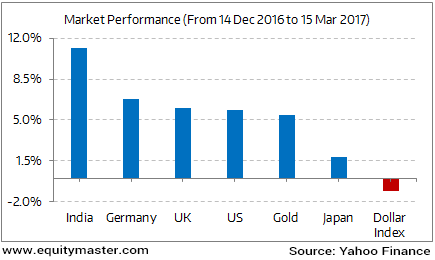India's Third Giant Leap
This Could be One of the Biggest Opportunities for Investors
- Home
- Todays Market
- Indian Stock Market News April 6, 2017
Sensex Trades Marginally Lower; Metal Stocks Witness Selling Thu, 6 Apr 11:30 am
After opening the day on a flat note, the Indian share markets witnessed choppy trades and are presently trading marginally lower. Sectoral indices are trading on a negative note with stocks in the metal sector and consumer durables sector witnessing maximum selling pressure.
The BSE Sensex is trading down 124 points (down 0.4%) and the NSE Nifty is trading down 37 points (down 0.4%). The BSE Mid Cap index is trading down by 0.3%, while the BSE Small Cap index is trading down by 0.4%. The rupee is trading at 64.99 to the US$.
After closing the trading session near its all-time high yesterday, the Sensex is trading on a cautious note today ahead of the RBI monetary policy review.
The Reserve Bank of India (RBI) is going to review its first bi-monthly money policy and announce its targets for the financial year 2017-18.
Many expect the RBI to keep the interest rates unchanged. However, all eyes are focused for cues that the RBI's statement is going to deliver.
There are many issues which, in the present scenario, are demanding RBI's attention. The problem of rising inflation. Banks' bad loan woes. Excess liquidity. Rising rupee. The global economic set-up.
Most of the attention is on what measures the RBI will initiate to suck the excess liquidity out of the banking system. This is because credit growth is hovering at its historic lows; and banks are flush with cash post notebandi.
What measures the RBI will take on the above issues...we'll know within a couple of hours.
Regarding the RBI's decision, it's hard to predict what the RBI will do and how the markets will react to it. This is because there are a whole host of other global and domestic factors that the RBI will consider before casting its decision on interest rate today.
And the best thing to do in such a scenario could be to stay focused on the value and comfort of the safest stocks.
Apart from the above, most of the volatility in Indian share markets is seen on the back of cues from the Federal Reserve. This comes as Fed's recent policy review yesterday showed that most policymakers believe the apex bank should start reducing its US$ 4.5 trillion balance sheet later this year as long as the economic data holds up.
The above move can have a negative impact on the emerging stock markets.
So far, starting from 2008, the swelling balance sheet of the Fed has propped the US economy. And the same had aided the rally in emerging markets through all these years. So any change in the Fed's balance sheet will have an immediate impact on the emerging stock markets.
Also, the move would cause the bond prices to fall. As the Fed starts selling its bonds, the supply would mean lower bond prices.
Further, the move would also cause the dollar to strengthen, as the Fed will reduce the volume of currency in circulation.
Apart from the above, the Fed has also projected three total interest rate hikes further this year. This, too, had led to volatility in global stock markets. The chart below indicates the performance of global market indices, the dollar, and gold from 14 December 2016 and 15 March 2017. This is the period between two consecutive fed rate hikes.
Stock Markets and Gold Rally, Dollar Tumbles
We doubt the Fed's capacity to further raise interest rates. As Bill Bonner wrote in one of the editions of Vivek Kaul's Diary...
- You know our prediction: The Fed will never willingly lead interest rates to a neutral position.
It can't. It has created a debt monster. It must feed this Frankenstein with easy credit.
However, if the Fed does raise its interest rates, it would lead to the end of easy money and create big trends that Asad believes traders can profit from.
For information on how to pick stocks that have the potential to deliver big returns, download our special report now!
Read the latest Market Commentary



Equitymaster requests your view! Post a comment on "Sensex Trades Marginally Lower; Metal Stocks Witness Selling". Click here!
Comments are moderated by Equitymaster, in accordance with the Terms of Use, and may not appear
on this article until they have been reviewed and deemed appropriate for posting.
In the meantime, you may want to share this article with your friends!